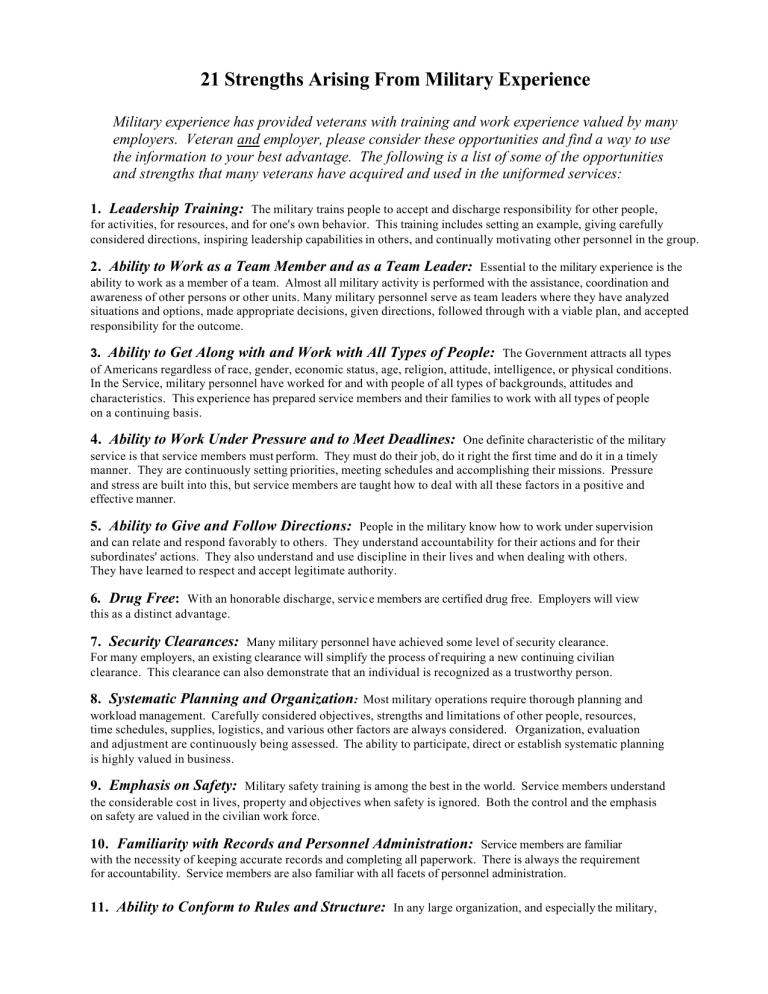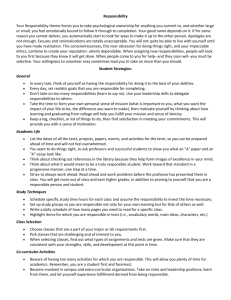21 Strengths Arising From Military Experience

21 Strengths Arising From Military Experience
Military experience has provided veterans with training and work experience valued by many employers. Veteran and employer, please consider these opportunities and find a way to use the information to your best advantage. The following is a list of some of the opportunities and strengths that many veterans have acquired and used in the uniformed services:
1. Leadership Training: The military trains people to accept and discharge responsibility for other people, for activities, for resources, and for one's own behavior. This training includes setting an example, giving carefully considered directions, inspiring leadership capabilities in others, and continually motivating other personnel in the group.
2. Ability to Work as a Team Member and as a Team Leader: Essential to the military experience is the ability to work as a member of a team. Almost all military activity is performed with the assistance, coordination and awareness of other persons or other units. Many military personnel serve as team leaders where they have analyzed situations and options, made appropriate decisions, given directions, followed through with a viable plan, and accepted responsibility for the outcome.
3 . Ability to Get Along with and Work with All Types of People:
The Government attracts all types of Americans regardless of race, gender, economic status, age, religion, attitude, intelligence, or physical conditions.
In the Service, military personnel have worked for and with people of all types of backgrounds, attitudes and characteristics. This experience has prepared service members and their families to work with all types of people on a continuing basis.
4. Ability to Work Under Pressure and to Meet Deadlines: One definite characteristic of the military service is that service members must perform. They must do their job, do it right the first time and do it in a timely manner. They are continuously setting priorities, meeting schedules and accomplishing their missions. Pressure and stress are built into this, but service members are taught how to deal with all these factors in a positive and effective manner.
5. Ability to Give and Follow Directions:
People in the military know how to work under supervision and can relate and respond favorably to others. They understand accountability for their actions and for their subordinates' actions. They also understand and use discipline in their lives and when dealing with others.
They have learned to respect and accept legitimate authority.
6 . Drug Free : With an honorable discharge, servic e members are certified drug free. Employers will view this as a distinct advantage.
7. Security Clearances: Many military personnel have achieved some level of security clearance.
For many employers, an existing clearance will simplify the process of requiring a new continuing civilian clearance. This clearance can also demonstrate that an individual is recognized as a trustworthy person.
8. Systematic Planning and Organization
: Most military operations require thorough planning and workload management. Carefully considered objectives, strengths and limitations of other people, resources, time schedules, supplies, logistics, and various other factors are always considered. Organization, evaluation and adjustment are continuously being assessed. The ability to participate, direct or establish systematic planning is highly valued in business.
9. Emphasis on Safety: Military safety training is among the best in the world. Service members understand the considerable cost in lives, property and objectives when safety is ignored. Both the control and the emphasis on safety are valued in the civilian work force.
10.
Familiarity with Records and Personnel Administration:
Service members are familiar with the necessity of keeping accurate records and completing all paperwork. There is always the requirement for accountability. Service members are also familiar with all facets of personnel administration.
11. Ability to Conform to Rules and Structure: In any large organization, and especially the military,
there must be rules and structure to avoid chaos and internal breakdown. Individuals in the service have learned and followed rules everyday in their working environment. While in this environment, they have also learned loyalty to their units and their leaders. Companies always value employees who will be "company players" and team members that follow "the rules" of the organization.
12.
Flexibility and Adaptability: All individuals in the service have learned to be flexible and adaptable to meet the constantly changing needs of any situation and mission. Last minute changes are not uncommon in any military or civilian working environment. Also based on their military background, former soldiers are able to adapt quickly to physical and safety demands.
13.
Self-Direction:
Many service members understand difficult and often complex issues and solve these issues or problems on the spot without step-by-step guidance from above.
14. Educated: All military soldiers have at least a G.E.D. and the majority of them have high school diplomas.
Many have attended college to further their education.
15. Initiative: Many military personnel have the ability to originate a plan of action or task to answer and solve many unusual problems regard ing supplies, logistics, resources and transportation.
16. Work Habits:
People in the military stay and finish their projects and are known and are recognized for completing their missions in a timely fashion and in an effective, efficient manner. These work habits are a definite result of social maturity, integrity, determination and self-confidence that they have learned, earned and experienced in their military service. Their military background has instilled pride, enthusiasm and perseverance for t heir work. This constitutes their eligibility and recognition for promotion.
17. Standards of Quality and Commitment to Excellence: Service personnel are continually striving to attain and surpass their standards of quality for themselves and their units. These standards of quality are meeting their unit's mission, training standards, physical requirements and educational goals. There is a commitment to excellence in all of these fields.
18. Global Outlook: Many people in the military have been stationed and served their country in various locations around the world. This residency and international experience have broadened their outlooks in regards to customs, economies, languages and cultures of other countries.
19.
Client and Service-Oriented:
Many military personnel are in the service industry. Their jobs are to facilitate, explain and expedite their patrons and clients needs, wants and actions, such as administrative, medical, dental, postal, financial and recreational.
20. Concerned About the Community and Family Environment: Service personnel have a vested interest in their areas where they reside. Many are committed to making their locations a better place to live.
They are dedicated to the quality of life for their family members and their fellow residents. They participate and volunteer in youth sports, scouting activities, family and unit outings, area clean-up days, seasonal and unit parties and gatherings, and developmental programs.
21. Specialized Advanced Training:
All service personnel receive advanced training in their fields.
Their career fields designate a specialized focus and skill building for their individual jobs. Advanced training and cross-referenced training can be in the computerized, financial, medical, engineering, administrative, personnel, technical, mechanical, and security fields. This training can be completed in the classroom, in the office, on the location, in the laboratory, or on the job.

![190 vet class 18 military to career [PPTX]](http://s2.studylib.net/store/data/018009274_1-dabffad2c8413b6dba65503def7ef41a-300x300.png)